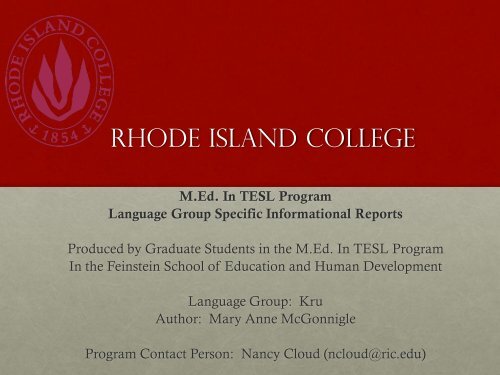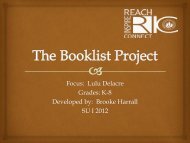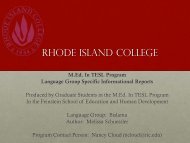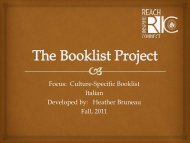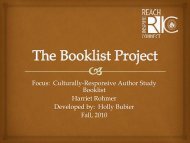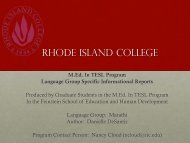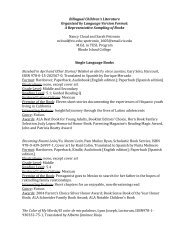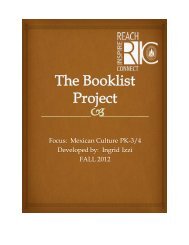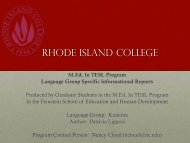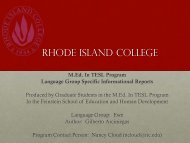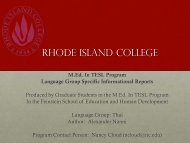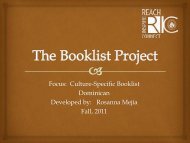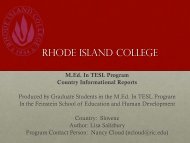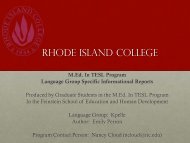Create successful ePaper yourself
Turn your PDF publications into a flip-book with our unique Google optimized e-Paper software.
Rhode Island College<br />
M.Ed. In TESL Program<br />
Language Group Specific Informational Reports<br />
Produced by Graduate Students in the M.Ed. In TESL Program<br />
In the Feinstein School of Education and Human Development<br />
Language Group: Kru<br />
Author: Mary Anne McGonnigle<br />
Program Contact Person: Nancy Cloud (ncloud@ric.edu)
<strong>KRU</strong>:<br />
A <strong>LANGUAGE</strong> <strong>OF</strong> <strong>LIBERIA</strong><br />
BY MARYANNE MCGONNIGLE<br />
TESL 539<br />
Spring 2011
<strong>KRU</strong> IS A MEMBER <strong>OF</strong> THE NIGER-CONGO A<br />
FAMILY <strong>OF</strong> AFRICAN <strong>LANGUAGE</strong>S<br />
AFRICAN <strong>LANGUAGE</strong>S<br />
ARE BROKEN DOWN<br />
INTO SIX FAMILIES<br />
FAMILIES ARE GROUPED<br />
ACCORDING TO SHARED<br />
STRUCTURES SUCH AS<br />
THE EMPLOYMENT <strong>OF</strong><br />
CLICKS, PREFIXES AND<br />
SUFFIXES, OR <strong>OF</strong> A NOUN<br />
CLASS SYSTEM<br />
www.maps.com
<strong>KRU</strong><br />
or<br />
CREW
<strong>LANGUAGE</strong> IS EVER<br />
CHANGING<br />
COLONIAL<br />
TRIBAL<br />
TRADE<br />
• <strong>KRU</strong> EVOLVED OUT <strong>OF</strong> CONTACT<br />
WITH AN IMMENSE VARIETY <strong>OF</strong><br />
<strong>LANGUAGE</strong>S SUCH AS THOSE <strong>OF</strong><br />
COLONISTS, TRADERS AND AFRICAN<br />
TRIBES.<br />
•THIS CONTACT LED TO THE<br />
EXPANSION AND SHIFTING <strong>OF</strong><br />
<strong>LANGUAGE</strong>S.
<strong>KRU</strong><br />
WESTERN<br />
<strong>KRU</strong><br />
EASTERN<br />
<strong>KRU</strong><br />
BASSA<br />
GREBO<br />
BÉTÉ
SYNTACTIC PATTERNS<br />
<strong>KRU</strong> IS A MIXED ORDER SYSTEM<br />
• WORD ORDER DEPENDS <strong>OF</strong> THE TYPE <strong>OF</strong> SENTENCE<br />
• BASIC WORD ORDER = SUBJECT/ VERB/OBJECT/OTHER<br />
SUFFIXING<br />
• ALL <strong>KRU</strong> <strong>LANGUAGE</strong>S ARE EXCLUSIVELY SUFFIXING<br />
• TENSE IS REPRESENTED BY SUFFIXES<br />
o SUFFIXICATION MAY INDICATE RECENT PAST, FAR PAST, PRESENT,<br />
NEAR FUTURE, DISTANT FUTURE AND MORE SPECIFIC TENSES<br />
• QUALITIES SUCH AS NUMBER AND DEFINITENESS MAY BE MARKED<br />
BY SUFFIXES<br />
• MANY <strong>OF</strong> THE <strong>LANGUAGE</strong>S USE A NOUN CLASS SYSTEM WHERE<br />
SUFFIXING IS USED
<strong>KRU</strong> ALPHABETS<br />
<strong>KRU</strong> <strong>LANGUAGE</strong>S HAVE BETWEEN 7 AND 9 VOWELS<br />
MOST HAVE NASAL VOWELS<br />
AVERAGE <strong>OF</strong> 25 CONSANANTS
<strong>KRU</strong><br />
IS<br />
TONAL<br />
TONES ARE ATTACHED<br />
TO VOWELS<br />
3 TONES MOST<br />
COMMONLY EMPLOYED:<br />
HIGH<br />
MID<br />
LOW<br />
5 TONES MAY BE<br />
EMPLOYED:<br />
<br />
<br />
<br />
<br />
<br />
HIGH<br />
MID-LOW<br />
DRAG<br />
GRAVE<br />
DOUBLE
ERRORS IN PHONOLOGY<br />
/l/ phoneme lessened or omitted<br />
ex. alright = a’right.<br />
ex . fool = foo’.<br />
f/voiced “th” substitution at end or middle of word<br />
ex. teeth = teef<br />
ex. nothing = nufin’<br />
d/voiced “th” substitution at the beginning, middle of words<br />
ex. this = dis<br />
ex. brother = broder
POSSIBLE ERRORS IN SYNTAX<br />
TENSE<br />
SINCE TENSES ARE<br />
REPRESTED BY SUFFIXES IN<br />
<strong>KRU</strong>, WORDS USED TO<br />
MARK TENSE MAY BE LEFT<br />
OUT OR MISUSED<br />
URGE TO USE SUFFIXES TO<br />
CONVEY TENSE MAY<br />
CHANGE MEANING <strong>OF</strong><br />
SPEECH<br />
WORD ORDER<br />
WORDS MAY BE<br />
MISORDERED IN ATTEMPTS<br />
TO CONVEY MEANING<br />
OMITTING WORDS<br />
ESPECIALLY ARTICLES AND<br />
ADVERBS
EXAMPLES <strong>OF</strong> ERRORS IN SYNTAX<br />
‣ Omission of 3 rd person singular tense marker<br />
He talks a lot. >>> He talk a lot.<br />
‣ Omission of noun possessive<br />
That’s the woman’s car. >>> That the woman car.<br />
‣ A pronoun may be used to restate the subject<br />
Sam surprised me. >>> Sam, he surprised me.
COMMUNICATION STYES<br />
People who speak the Kru languages generally reside in Liberia and<br />
the Ivory Coast. Therefore, the communication styles are similar to<br />
most people from West Africa:<br />
• Children are not to maintain eye contact with adults since it is considered defiant to<br />
do so.<br />
• Adults are expected to maintain eye contact since it is considered respectful unless<br />
one is speaking with his or her boss or teacher.<br />
• Good oration is valued so people take their time getting their point across.<br />
• One must always greet others on the street, especially once eye contact has been<br />
made. It is a taboo to ignore this cultural value.<br />
• Greetings are made by a handshake with a finger snap ( soft snap for women, harder<br />
snap for men).<br />
• Maintain an arm’s distance while communicating.<br />
• It is not uncommon to touch another’s leg if seated while communicating.<br />
(www.culturecrossing.net)
BIBILIOGRAPHY<br />
Books<br />
Katzner, K. (2002). The languages of the world. Third edition. New York: Routledge.<br />
Roseberry-McKibbin, C. (2002). Multicultural students with special language needs: Practical<br />
strategies for assessment and intervention. Oceanside, CA: Academic Communication<br />
Associates, Inc.<br />
Internet Sites<br />
Kru languages. (2011) In Wikipedia. Retrieved April 1, 2011, from:<br />
http://en.wikipedia.org/wiki/Kru_languages<br />
Landers, M., & Grossman, L. (n.d.) Liberia and the Ivory Coast. Culture Crossing: A community<br />
built guide to cross-cultural etiquette and understanding. Retrieved from:<br />
www.culturecrossing.net
BIBILIOGRAPHY<br />
Marchese, L. (1986). Tense/Aspects and the development of auxiliaries in Kru languages. Diss.<br />
Arlington, TX: Summer Institute of Linguistics Publication of Linguistics Publication.<br />
Retrieved from: http://www.sil.org/acpub/repository/20012_front.pdf<br />
Niger-Congo languages. (2011) In Wikipedia. Retrieved April 1, 2011, from:<br />
http://en.wikipedia.org/wiki/Niger%E2%80%93Congo_languages<br />
Images<br />
Liberia Political Map & Niger-Congo [Maps]. (2010). Retrieved April 1, 2011, from:<br />
www.maps.com
M.Ed. in TESL Program<br />
Nancy Cloud, Director<br />
Educational Studies Department<br />
Rhode Island College, HBS 206 #5<br />
600 Mt. Pleasant Avenue<br />
Providence, RI 02908<br />
Phone (401) 456-8789<br />
Fax (401) 456-8284<br />
ncloud@ric.edu<br />
The M.Ed. in TESL Program at Rhode Island College<br />
is Nationally Recognized by TESOL and NCATE


